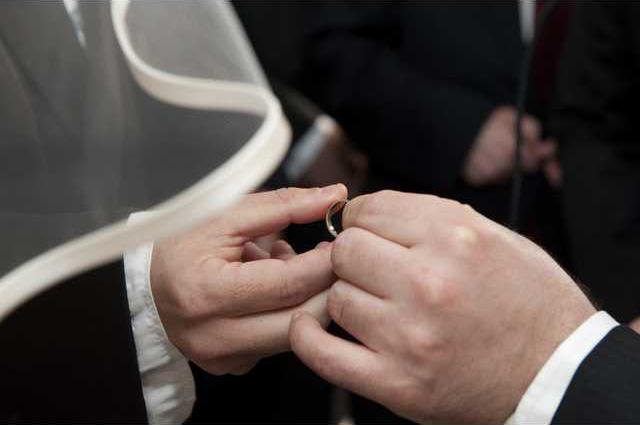The often complicated spectre of divorce is being made even more difficult for one group of women: Orthodox Jews, whose faith requires not only a civil court divorce, but a religious decree from the husband granting his wife a divorce.
Without the decree, called a "get," neither husband nor wife can remarry within their faith, although there's been at least one widely publicized case of an Orthodox Jewish man claiming permission from 100 rabbis to remarry, despite denying his wife the decree.
Newsweek magazine reported this week on the issue in a story headlined, "In Orthodox Jewish Divorce, Men Hold All the Cards." The magazine began with the story of Rabbi Mendel Epstein, now on trial with several associates, for allegedly organizing a kidnap-and-torture ring that, for a fee, would pressure reluctant husbands to grant the get.
An Orthodox woman who doesn't receive her husband's consent by a rabbinical court to divorce "is an agunah, a 'chained' woman. If she falls in love and decides to remarry without the get, she would be considered an adulteress, and her children from that union would be shunned," the magazine said.
According to Newsweek, the notion of applying more than verbal pressure to obtain a get was an open secret in the community. "Beat-downs and kidnappings are a long-whispered-about last resort for agunot who face years chained to men who wont let them go. Controlled by husbands who manipulate their position, wield emotional and legal power, and leverage their marriages for their own gain, these women are a gruesome example of domestic abuse," the magazine reported.
Orthodox Jewish leaders and others are recognizing the continuing problem and are trying to find solutions, media reports indicate. In Israel, where there are many Orthodox marriages, NewsTalkFM radio reported that prenuptial agreements are coming into vogue as a way to avoid problems should a marriage fail.
"The proposed agreement would entitled engaged couples to outline divorce terms before their marriage, meaning that the issuing of a get is agreed in advance," the station reported. "If the male spouse refuses to commence divorce proceedings or drags it out over a long period of time, he could be fined up to half his salary every month."
In the United States, women from various religious traditions who are having difficulty ending religious or arranged marriages are coming together for support and assistance, The New York Times reported.
One group, Unchained at Last, "provides legal services because most of the womens cases involve divorce and child custody litigation, and some extend into immigration status and restraining orders against a violent spouse," the paper said. The organization is run by Fraidy Weiss, an Orthodox Jewish woman who struggled to get the religious divorce decree, and Shehnaz Abdeljaber, a woman of Palestinian Muslim descent who was able to break free of an arranged engagement.
Orthodox Judaism isn't the only faith tradition struggling with the issues involving divorce. Time magazine reported that the Roman Catholic Church is examining its practice of requiring divorced members to receive an annulment from the church of their previous marriage before they can receive communion or remarry within the church.
The matter may be decided by a Vatican synod this year, the article said. "In February 2013, the pontiff tapped (Cardinal Walter) Kasper to re-open a debate among cardinals about inviting the divorced and remarried back to the sacraments in at least some cases, but has also allowed several of his own aides to insist publicly that change is impossible."
While awaiting formal changes from the Vatican, one Roman Catholic diocese, the Archdiocese of Pittsburgh, is making the annulment process cost-free for its members, the Pittsburgh Tribune-Review reported.
And Saudi Arabia's Arab News reported in January on a "dramatic increase" in requests by women in the Muslim kingdom for a khula, or an Islamic religious divorce only a woman can request.
There have been delays in Saudi courts granting the request, but the newspaper said the situation is changing.
"If the court is convinced of the evidence, the judge can pronounce a khula order," Saudi News said. "The judge also examines whether the wife is financially sound enough to return the dowry in full or the amount she can return."
Without the decree, called a "get," neither husband nor wife can remarry within their faith, although there's been at least one widely publicized case of an Orthodox Jewish man claiming permission from 100 rabbis to remarry, despite denying his wife the decree.
Newsweek magazine reported this week on the issue in a story headlined, "In Orthodox Jewish Divorce, Men Hold All the Cards." The magazine began with the story of Rabbi Mendel Epstein, now on trial with several associates, for allegedly organizing a kidnap-and-torture ring that, for a fee, would pressure reluctant husbands to grant the get.
An Orthodox woman who doesn't receive her husband's consent by a rabbinical court to divorce "is an agunah, a 'chained' woman. If she falls in love and decides to remarry without the get, she would be considered an adulteress, and her children from that union would be shunned," the magazine said.
According to Newsweek, the notion of applying more than verbal pressure to obtain a get was an open secret in the community. "Beat-downs and kidnappings are a long-whispered-about last resort for agunot who face years chained to men who wont let them go. Controlled by husbands who manipulate their position, wield emotional and legal power, and leverage their marriages for their own gain, these women are a gruesome example of domestic abuse," the magazine reported.
Orthodox Jewish leaders and others are recognizing the continuing problem and are trying to find solutions, media reports indicate. In Israel, where there are many Orthodox marriages, NewsTalkFM radio reported that prenuptial agreements are coming into vogue as a way to avoid problems should a marriage fail.
"The proposed agreement would entitled engaged couples to outline divorce terms before their marriage, meaning that the issuing of a get is agreed in advance," the station reported. "If the male spouse refuses to commence divorce proceedings or drags it out over a long period of time, he could be fined up to half his salary every month."
In the United States, women from various religious traditions who are having difficulty ending religious or arranged marriages are coming together for support and assistance, The New York Times reported.
One group, Unchained at Last, "provides legal services because most of the womens cases involve divorce and child custody litigation, and some extend into immigration status and restraining orders against a violent spouse," the paper said. The organization is run by Fraidy Weiss, an Orthodox Jewish woman who struggled to get the religious divorce decree, and Shehnaz Abdeljaber, a woman of Palestinian Muslim descent who was able to break free of an arranged engagement.
Orthodox Judaism isn't the only faith tradition struggling with the issues involving divorce. Time magazine reported that the Roman Catholic Church is examining its practice of requiring divorced members to receive an annulment from the church of their previous marriage before they can receive communion or remarry within the church.
The matter may be decided by a Vatican synod this year, the article said. "In February 2013, the pontiff tapped (Cardinal Walter) Kasper to re-open a debate among cardinals about inviting the divorced and remarried back to the sacraments in at least some cases, but has also allowed several of his own aides to insist publicly that change is impossible."
While awaiting formal changes from the Vatican, one Roman Catholic diocese, the Archdiocese of Pittsburgh, is making the annulment process cost-free for its members, the Pittsburgh Tribune-Review reported.
And Saudi Arabia's Arab News reported in January on a "dramatic increase" in requests by women in the Muslim kingdom for a khula, or an Islamic religious divorce only a woman can request.
There have been delays in Saudi courts granting the request, but the newspaper said the situation is changing.
"If the court is convinced of the evidence, the judge can pronounce a khula order," Saudi News said. "The judge also examines whether the wife is financially sound enough to return the dowry in full or the amount she can return."

